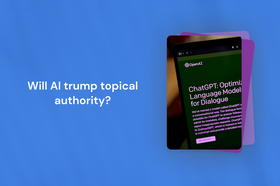Content creation: Reduce costs without compromising quality
Discover how AI has revolutionized content creation and the best techniques for creating high-quality content at a lower cost.
Updated December 3, 2024

Investing in content is more important today than ever because of AI. While AI has made content creation easier, it's also become much more competitive. You need to create higher-quality content to rank on search engines and perform well on social media. As a result, creating effective marketing content actually requires a much bigger investment than before.
In this article, I'll explain the costs of different types of content and discuss a few proven ways to reduce your content creation expenses while prioritizing quality.
Key takeaways
- AI made content creation more accessible and content marketing more competitive than before.
- While businesses want to reduce costs, they shouldn't compromise quality.
- There are different costs depending on the type of content and platform you want to create content for.
- There are ways to create content at scale while reducing the costs.
Factors influencing content creation costs
There are many factors that influence content creation costs, including:
- Type of content creator: Costs vary depending on whether the creator is an influencer, expert, or presenter, as well as their professional background. For example, a CFO might cost more than an accountant.
- Content medium: Video content typically requires more resources and is more expensive to produce than written content.
- Content length: Longer content, whether articles or videos, demands more time and effort, which increases costs.
- External vs. internal content creation: Creating content in-house generally costs less than outsourcing but comes with the added expense of maintaining full-time employees.
- Complexity of the content: The extent of editing required and the overall complexity of the content can significantly affect production costs. More complex projects that require heavy editing can be more expensive.
» Chat with us to find out how we can help reduce your content creation costs.
Types of content and their associated costs
SEO content creation costs
Content for SEO can be divided into two main types:
- Website content: Your homepage, product pages, feature pages, and other content that speaks directly about your business.
- Articles: Content targeting your audience, helping solve their challenges.
According to Forbes Advisor, SEO content can cost between $200 and $2,000 per 1,000-word article when using individual creators and up to $10,000 per project per month with an SEO agency.
Social media content creation costs
The cost of social media content depends on several factors, including content type, creator, and platform. Sprout Social estimates that businesses can expect to pay about $7,950 per month for social media content creation across various platforms and roughly $17,950 per month for a full social media management program.
Working with influencers can make social media content creation even more expensive. Here's how much it could cost you per platform, according to Shopify:
- Instagram: Nano-influencers (500–10,000 followers) charge $10 to $100 per post. These rates increase significantly based on follower count, reaching over $10,000 for mega-influencers (500,000+ followers).
- TikTok: Costs range from $5 to $25 per post for nano-influencers (1,000–10,000 followers) to over $2,500 per post for mega-influencers (1 million+ followers).
- YouTube: Nano-influencers (10,000–50,000 followers) start at $20 to $200, with mega-influencer (1 million+ followers) rates exceeding $20,000.
Each platform's pricing depends on how many followers the influencer has and the type of content they produce.
» Want to produce social media content for less? Talk to an expert to find out how.
Video content creation costs
Creating video content is challenging and, therefore, usually more expensive. Common types of video include:
- Product demo videos
- Explainer videos
- Ads
- Social media videos
- Customer testimonials and case studies
Video creation costs range between $2,000 and $15,000, depending on the length and complexity of the video. Creating simple videos in-house can be more affordable, with costs limited to your smartphone, basic editing software (subscriptions range from $10 to $50 per month), and any additional props or lighting.
» Get cost-effective video content at scale with Entail's video marketing software.
Sales collateral content creation costs
Sales collateral, case studies, graphics, and reviews support the user journey and the purchase consideration process by emphasizing your product's value and identity.
Sales collateral creation costs can be broken down as follows:
- The cost of case studies ranges between $500 to $3,000.
- A static graphic costs about $100 to $2,000 per graphic.
- The price of a standard 1,000-word review is between $100 and $1,000.
» Book a consultation to discuss how you can slash content creation costs.
How to reduce content creation costs (with or without AI)
Content creation costs are influenced by volume and the need to ensure a strong return on investment (ROI). Here's how you can create affordable, accurate content that precisely targets your audience and their searches, ranks well on Google, and performs well on social media.
» Learn how to measure SEO ROI.
1. Select the right topics
Focus on creating necessary content that's likely to perform well. To do that, you have to analyze search volume and competition to understand what content ranks for the target queries and find ways to outrank it.
During the ideation stage, leverage AI to reduce content costs. You can use AI tools like ChatGPT to come up with ideas, but the data won't always be accurate. A tool like Entail's content strategy software can help you find topics with the best potential to rank.
2. Choose creators based on expertise, not followers
It can be more cost-effective to work with content creators who have relevant expertise rather than those with a large following. Only use high-profile creators only when they add significant value. For example, it would make sense to use them to create bottom-of-the-funnel content to reach audiences on social media.
» Instead of paying per word, pay experts for their time with Entail's content marketplace.
3. Edit with AI
Leveraging AI for editing purposes can also help you save on costs. AI assistants like Claude and ChatGPT can quickly review and refine your content. This reduces the time editors need to spend on each piece and allows them to focus on shaping the overall content marketing strategy and adding creative touches, ultimately leading to higher-quality content at a lower overall cost.
» Use advanced AI-powered editing capabilities with Entail's content management system.
4. Streamline your content creation process
Use a platform like Entail's content management system (CMS) to speed up and improve your content creation process. It reduces the time and costs associated with revisions and collaboration by allowing you to:
- Work with your content team in one place, cutting down on back-and-forth emails and meetings
- Leverage AI tools directly within the platform to assist with writing and editing
- Use ready-made templates to quickly start new content pieces without designing from scratch
- Apply custom design themes consistently across all content, saving time on formatting
- Optimize for search engines as you create, thanks to its built-in SEO features
These features streamline your workflow, reduce the need for multiple tools, and help you create high-quality, SEO-friendly content at scale more efficiently, ultimately saving both time and money.
5. Guest posting
Another way to reduce content creation costs is through guest posting. You can collaborate with experts from other companies who are looking to establish their authority or promote themselves. Since both parties gain value from the arrangement, these experts often won't charge, allowing you to produce high-quality content at little to no cost.
» Talk to an SEO expert to find out if guest posting is the best option for your website.
6. Repurposing content
You can repurpose content to really maximize its value. One piece of content can be used in many formats across various platforms. For example, at Entail, we turn articles into videos for social media that we adapt to different platforms and lengths.
» Book a free call to learn how to repurpose your content for different formats.
7. Optimizing existing content
It's often more cost-effective to update and improve existing content that's already performing well rather than create new content from scratch. Plus, if you're optimizing for conversions, you can reduce content creation costs while increasing revenue.
8. Leverage user-generated content
Encourage your customers to create images, videos, stories, etc., that you can post across various platforms and incorporate into your content. This will save you costs and enrich your content with authentic customer experiences. It may even help pay for your other content.
» Talk to an expert about how to add user-generated content to your marketing strategy.
Improve content quality while reducing costs
ChatGPT has made content creation more accessible, but also more competitive. Despite this, businesses should continue creating content because there's a rising demand. Focus on creating high-quality content without compromising on quality. Using platforms like Entail for ideation, strategy, content creation, and expert collaboration can reduce costs and give your business a competitive edge.
» Learn how to measure content marketing ROI.




